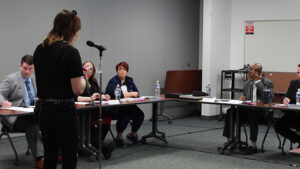Editor’s note: This version of the story clarifies that GSA had not yet met with President Kojo Quartey.
The discussion about bathroom safety at MCCC between administrators, students and the Gender & Sexuality Alliance continued on March 25, marking it the third Board of Trustees meeting in a row.
The GSA continued to advocate for the safety and comfort of students when using public restrooms on campus, and several students spoke out about concerns they had with MCCC administration addressing the ongoing issue.
MCCC student Elizabeth Bradley spoke on behalf of the GSA regarding the club meeting they had with MCCC President Kojo Quartey.
“Communication and understanding are the only way that we are gonna get through this,” Bradley said.

One community member, Tom Heck, said the MCCC administration lacks transparency when it comes to the inclusive restroom policy.
“My perception and that of most of the parents that I’ve spoken to is that these decisions have been made in backroom deals involving a very small group of students, two or three activist instructors,” Heck said. “And for some unknown reason the administration of the MCCC foundation.”
MCCC is legally obligated to allow students to use the restroom that correlates with their gender identity. Following Heck’s statement, student Sam Francis spoke out concerning a personal story Quartey shared during the meeting on Feb. 26.
Quartey had recalled his time at Mississippi State University where he had been a part of one of the few Black fraternities on campus, being one of the first to have a house on fraternity row. He described how his fraternity had been greeted with discrimination and harassment repeatedly until they decided to leave.
“Y’know how we resolved that issue? For our safety, for our peace of mind and our sanity, we moved,” Quartey said. “We had every right to be on fraternity row, but we moved.”
Francis expressed that the message of the story was confusing since it was a response to the harassment transgender students were facing on campus. Francis said students interpreted this message as Quartey recommended moving as a solution to the harassment happening at MCCC.
“Dr. Quartey believes us students have misinterpreted his statement, my peers and I are confused as to how to correctly interpret his story of facing injustice in which the ultimate solution was moving,” Francis said. “We will not move.”
Other students, Jay Schumacher and Spencer Lyke, pointed out how the college had invited a transgender speaker by the name of Jamie O’Brien to campus.
O’Brien had been scheduled to speak on the transgender experience the same day and time as a scheduled GSA meeting would be taking place only a few doors down.
Schumacher then pointed out that the GSA was not included in scheduling a speaker for this event, and O’Brien had views on transgender conformity that were opposite of the views the GSA holds.
“Just because a person is transgender doesn’t mean they cannot have harmful views on trans and gender non-conforming communities,” Schumacher said. The event ended up being canceled before the speaker could visit.
Lyke shared the perspective of intersex students attending MCCC with the limited number of unisex restrooms on campus.
“I won’t limit myself to a single restroom just because people are uncomfortable with my existence,” Lyke said. “Especially when those restrooms aren’t available in most public spaces.”
Lyke said the unisex bathrooms at MCCC are a Band-Aid to the larger issue of student harassment that has not been taken seriously by the administration.
It was also expressed that due to varying reasons, not all GSA members are willing to attend the meeting with Quartey out of concern for their safety. The GSA believes a third-party mediator would be beneficial to both parties.
Bradley reiterated that with all the opposing views, it would take communication to solve this issue.
“I really would like to see more transparency,” Bradley said.
Chair Aaron Mason said when there is a divide on policy and opinions are far from agreement, following the law is the best course to follow.
“If there’s something out there like that, that you can point to that most people can agree on,” Mason said. “Well, that is the law so let’s at least agree on that and then you solve a problem a little bit more broadly based on that.”
Mason continued to stress that the administration’s support for trans students wasn’t solely due to the Elliot-Larsen Act and that Quartey is navigating these issues along with staff.
“I just wanna say and I wanna be very clear about this and I’ve said this and I know it’s just words but LGBTQ+ rights are human rights, period,” Quartey said.

